Round Table: "Croatia without single-use plastics?"
Zelena Akcija, FoE Croatia, organized a round table in the Journalist Home where relevant stakeholders gathered around the problem of single-use plastic pollution. It was concluded that It is necessary to establish dialogue and cooperation to reach a satisfactory solution to the problem of single-use plastic pollution.
The goal was to discuss the current legislation related to packaging, packaging waste and single-use plastics, with particular emphasis on the deposit return system (DRS) and returnable packaging and examples of good practices in introducing systematic reuse.
The first-panel discussion was attended by: Ana-Marija Mileusnić, Campaigner Against Plastic Pollution in Zelena akcija, Gordana Pehnec Pavlović from the Sector for Industry and Sustainable Development of The Croatian Chamber of Economy and Petra Andrić, program manager of the Greenpeace Croatia. The Ministry of Economy and Sustainable Development, a key stakeholder in the legislative debate, did not respond to the round table.
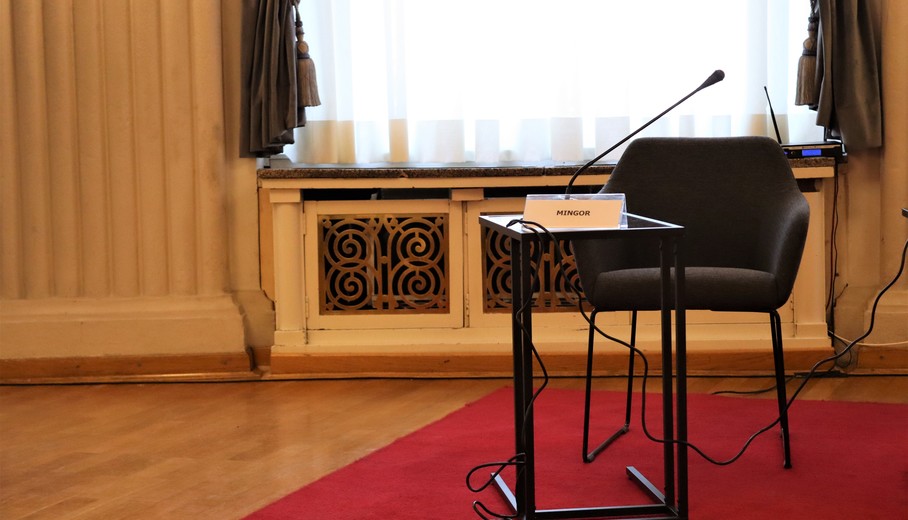
They discussed the implementation and application of the current legislation and the proposal for a new implementation document on the packaging, packaging waste, fishing gear and single-use plastics. Representatives of the associations highlighted the positive aspects of the legislation, such as the ban on certain single-use plastic items and light plastic bags, the expansion of the refund system, and the encouragement of reuse practices by restricting certain catering facilities only to using reusable food ware. However, according to the panelists, what could be problematic is that this law still needs to be implemented in many places, which they pointed out to the Croatian State Inspectorate and the Ministry of Economy and Sustainable Development last year. Zelena akcija believes that the implementation document would fulfill the ambition necessary for positive changes if the associations' comments in the public consultation were adopted.
Representatives of the industry, although with a different position on the issue of bans, also welcomed the expansion of the deposit return system (DRS), emphasising the importance of a higher rate of collection of waste packaging and the possibility of obtaining quality recyclate using a local source of raw materials. Pehnec Pavlović pointed out that the supposed encouragement of the "circular economy and innovative models" is problematic. Even though it is solved by bureaucracy, it is not used in practice. She concluded that packaging models for particular products could be better and that the industry, following the new legislation requirements, needs to be provided with financial support for optimisation and eventual conversion of production.
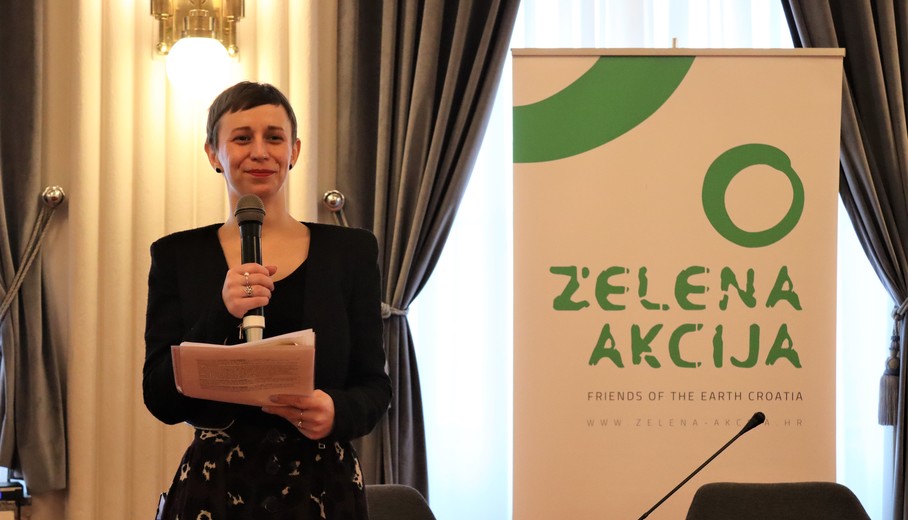
Although the industry's position is different on the issue of bans, the panelists agreed that a circular economy could be achieved only with the cooperation of all stakeholders within the system. It was concluded that it is necessary to establish dialogue and cooperation to reach a satisfactory solution as a society.
The participants of the second panel were: Ana-Marija Mileusnić, Campaigner Against Plastic Pollution in Zelena akcija, Zvonimir Majić, representative of the Fund for Environmental Protection and Energy Efficiency (FZOEU), Gregor Cerar, sustainability advisor of Tetra Pak and Dragica Bagarić, director of the association of the Eko Ozra beverage producer. The second panel discussed the future of DRS and packaging.
The prevailing opinion among the panelists was that the existing return fees and DRS should be improved, highlighting the excellent results of collected waste packaging since the system was introduced in Croatia. In addition to the high rate of collected packaging, other system advantages were singled out, such as increased recyclability and recycling and relief from the current plastic waste collection system through yellow bags and voluminous waste separation containers.
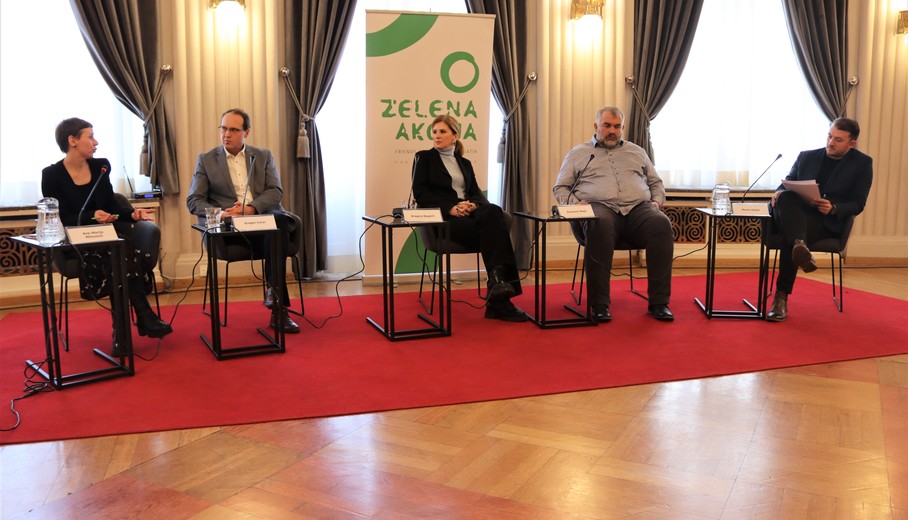
Tetra Pak's sustainability advisor applauds Croatia for being one of the first Europe countries to introduce a refund system. He compared Croatia with Slovenia, a much more advanced country in almost all waste management segments, which has only started introducing a refund system. As a successful example, he stated that, despite the generally high rate of separate waste collection, the collection rate for cans in Slovenia is only 40 percent. In comparison, different waste collection in Croatia is a high 80-90 percent. He believes that by entering the refund system, the rate of collected multi-layer cardboard packaging would also increase, surging the rate of recyclability and recycling.
The director of Eko Ozre warned of problems that could arise when packaging waste is collected through machines since they still need to be adjusted for different types of packaging. She said most packaging is managed manually, and the device contains only a smaller percentage. She concluded that it should be given enough time to adjust and that all taxpayers must enter the system.
The representative of FZOEU also agreed with the sufficient adjustment period and believed that the devices could be adapted straightforwardly to suit different types of packaging. Regarding the increase in the price, most of the panelists agreed that percentage of collected packaging must stay the same due to insufficient motivation to return it. The minimum refund amount in the rest of the European Union is 10 cents.
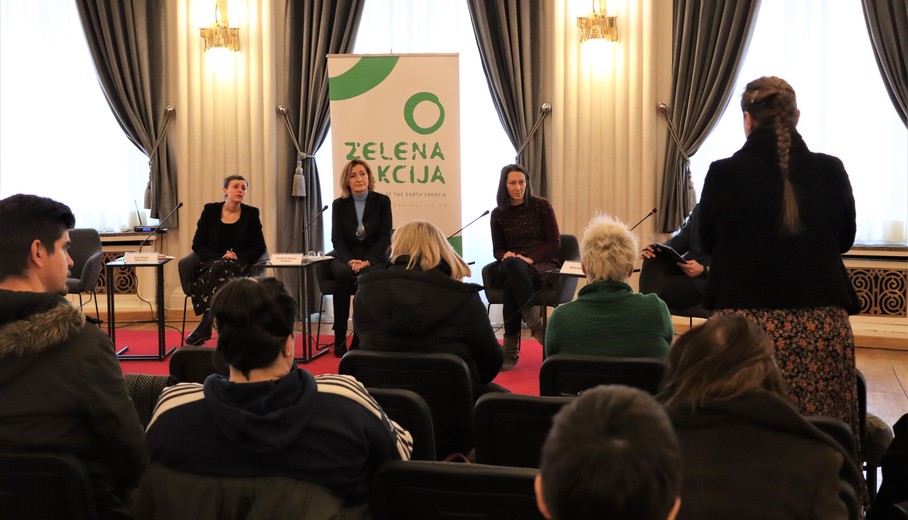
Zelena akcija believes the problem is that the deposit is built into the product's price. It increases the product's price, even though the deposit is fully returned to the consumer after the packaging is produced. Following the example of Sweden, it would be appropriate to separate the price of the packaging from the cost of the product to avoid such an effect.
In addition to DRS, how to improve the returnable packaging system was discussed. Considering that such packaging is refillable, it is proven to be the most sustainable waste packaging management practice. There were incentive fees for packaging in such a system, but in 2015, these fees were abolished. If we want such a system to come to life and be improved fully, the incentive fees must be returned. Such a system could function in parallel with the refund system so that, following the example of Lithuania, both single-use and reusable packaging are collected together. Such a packaging system could also be extended to products such as wine or milk, an example of good practice highlighted by Zelena akcija.
The round table ended with the third-panel discussion in which the following participated: Lovro Turalija, representative of the Zeleni Filozofski initiative, Damir Batarelo, URK (Močvara club) representative and Dragica Mateković Rubić from the Association for Independent Media Culture. They presented examples of good practices of the systematic introduction of reuse practices.
The Zeleni Filozofski initiative installed a shelf for communal reusable cups next to the coffee machine on the premises of its faculty, thereby preventing waste from single-use cups. Although this kind of initiative still needs to come to life fully, the main advantage is that the community understands the importance of reducing waste. The Močvara club introduced reusable polypropylene cups, reducing the plastic waste generated after concerts and other entertainment events.
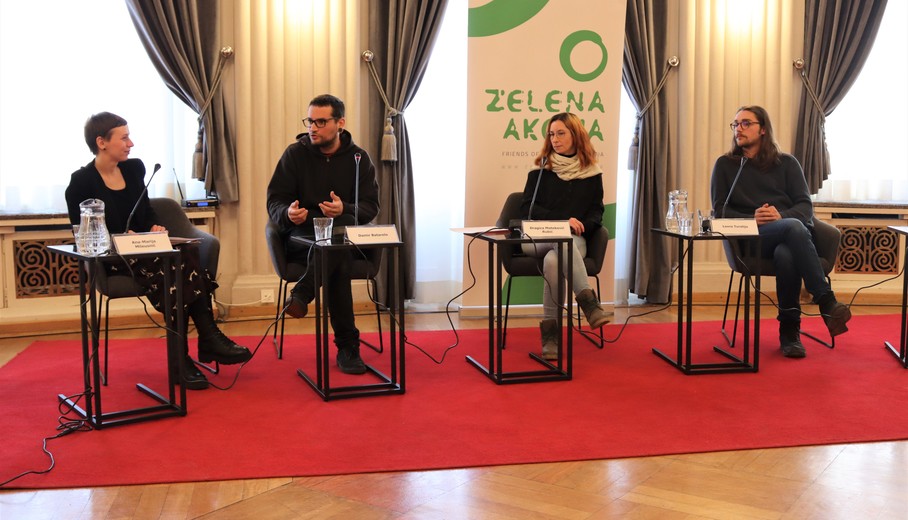
For several months, the Association of Independent Media Culture has been conducting educational workshops for citizens and HoReCa (hotel and restaurant) sector called "Bring your own" ("Ponesi svoje"). Through workshops, citizens were motivated to carry their packaging, and HoReCa were educated on encouraging customers to bring their packaging while meeting the legally prescribed sanitary conditions. Unfortunately, the educational campaign was carried out only in Zagreb due to the need for more funds. Therefore a budget should be determined for carrying out a similar campaign at the national level. This is important because the citizens and HoReCa have shown exceptional interest and willingness to adopt such a model.
In the introductory part, lawyer Luka Kos, an external expert associate of Zelena akcija, presented the "Analysis of the implementation of the Directive on single-use plastics in the Croatian legislation" ("Analizu provedbe Direktive o jednokratnoj plastici u hrvatskom zakonodavstvu"), which he prepared a year ago. The presentation of the analysis and the study are only available in Croatian HERE.
Please take a look at the entire photo gallery at the link.
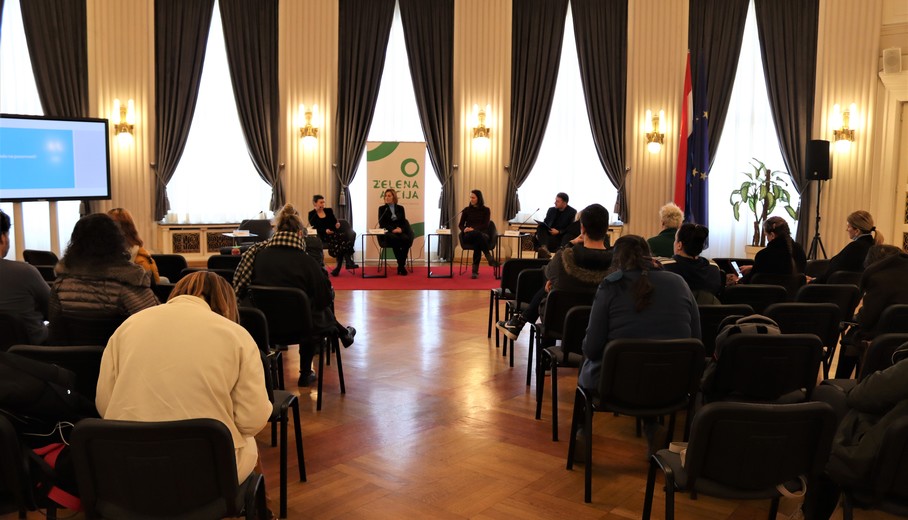
Analiza provedbe Direktive o jednokratnoj plastici u RH





